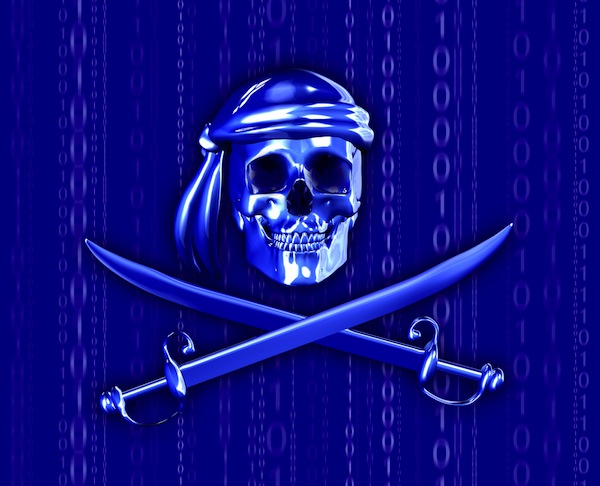The Battle Against Piracy Continues


Pirates are assholes. If they’re not hassling Peter Pan, they’re taking over French yachts or worst of all, bootlegging Hollywood movies.
Seriously, though, media piracy on the internet is a big problem that affects the economy as a whole and most importantly, people’s day-to-day lives. The public at large doesn’t have a lot of sympathy though, because they think everyone who works in movies is a fat cat, eating caviar while sitting in a bathtub full of champagne and snorting coke off a twenty-year-old’s titties. But I’ve lived and (sometimes) worked in Hollywood for years now, and I know what kind of money people who make movies really earn. And just like in most every other industry, there are some people who make ridiculous amounts of dough, and then there are the rest of us, who fall somewhere between “struggling” and “doing just fine.” And those are the folks who are getting hurt when you download The Hunger Games for free off some Russian website. So go ahead and live with that.
All that being said, while I don’t support pirating movies, I sure as hell understand it. Going to the movies costs way too damn much these days. Maybe I’m naïve, but I believe most people prefer to live honest lives. If you charge them a fair price, they’re usually content to pay it. But if you’re charging too much for what your product is worth, your customer feels taken advantage of, and then you’re going to start having a problem. And that’s what’s happening with movies today.
I feel like the recording industry has already lost their part of the battle against media piracy. With services like Pandora and Spotify, you’d never have to pay for music again if you didn’t want to. But the industry brought it on itself. Right before the whole Napster thing happened, they were charging twenty bucks for a CD over at Tower Records. That’s greedy as hell. If you’re gouging people and then they’re presented with a free alternative that’s accompanied by minimal risk of punishment, which one do you think they’re going to go with? Hint: Tower Records doesn’t exist anymore.
So, I firmly believe that the movie industry could save itself just by making going to see movies more affordable. But things almost never get cheaper. The idea of lowering prices is madness, right? So instead, they do stupid bullshit like this new initiative called the “Six Strikes” or “Copyright Alert System.” The five biggest internet service providers and the entertainment industry are banding together as one to strike a blow against piracy. Or at least they think that’s what they’re doing. Basically, their plan boils down to this: if your ISP detects that you’re sending or receiving copyrighted material, they will send you up to six warnings asking you to stop. If you don’t…they’ll slow down your internet connection.
Yeah. That makes sense.
Let’s say one afternoon, I walk into a 7-11 and steal a Snickers. They guy behind the register says out, “Hey, it’s not nice to steal,” but doesn’t try to stop me or anything. The next day I do it again. He says, “Maybe you didn’t hear me yesterday, but what you’re doing is wrong.” But I keep coming back. On days three and four, he demands a verbal acknowledgment from me that I know stealing is illegal, even though I keep doing it. Then, on the fifth day, he says, “Okay, I know we understand each other, so this is your final warning. If you come in here and steal one more Snickers, there will be consequences.” The next day, I show up to steal my Snickers and I see that he’s put boxes in my way, making it slightly more difficult to commit my daily crime. I can still steal the Snickers, though. It just takes me a little longer to do it.
You can just tell the whole thing was thought up by a committee, and at least three people on that committee were lawyers. It’s never going to work. It will never scare anyone, and honestly, I don’t think an ISP could get away with slowing your connection down, anyway. And even if they did, you’d just cancel your service and take your business elsewhere. Plus, this is the kind of thing that only targets the casual illegal file-sharer, anyway. It will have little to no effect on distributors of the protected material and instead seeks to punish the little guy. Jill Lesser of the Center for Copyright Infringement (a name that makes them sound as if they’re actually in favor of copyright infringement) seems to know the system lacks any real balls, insisting that it’s meant to educate rather than punish.
So, pretty lame. I bet this whole idea just fades away before it even gets close to coming into wide practice. Try again, Hollywood.
[Image via Shutterstock]







































